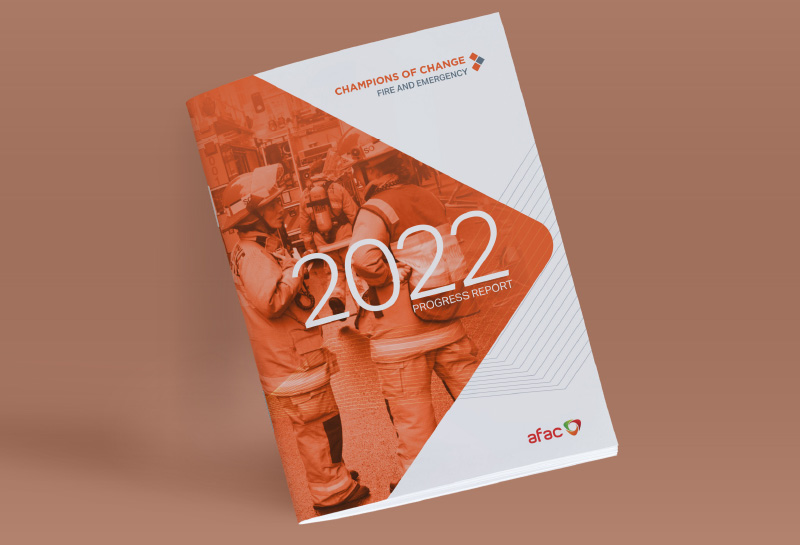Within the sector, AFAC members have identified the need to create diverse, safe and inclusive workforces, that are representative of the communities we support.
NSW State Emergency Service Commissioner and AFAC President, Carlene York APM, said ‘We need the best people throughout all our emergency service organisations – and by definition, the best people include a rich variety of backgrounds and perspectives that build strong and effective teams.’
A key focus area for the fire and emergency sector is gender equity. In support of this, the Champions of Change Fire and Emergency Group was established in 2017 with support from AFAC as the National Council for fire and emergency services. Convened by former Victorian Equal Opportunity and Human Rights Commissioner, Kristen Hilton, the group includes chief executives, commissioners and chief fire officers and other senior leaders representing member agencies responsible for fire, emergency and land management services across Australia and New Zealand who lead 126,000 employees and volunteers.
Taking action on the 5-year 2022 Progress Report
In March 2023, the group’s annual progress report was released. This year, in addition to case studies showcasing examples of the initiatives being undertaken by agencies, the report looked at progress made towards women’s equal representation in the sector in the 5 years since the group formed.
Overall, the data in the report shows that representation of women in the sector is increasing, particularly in senior leadership. While there is opportunity to accelerate this change, the data suggests that overall, the leadership and initiatives in the case studies are having a positive impact on gender equity.
Convenor of the Champions of Change Fire and Emergency Group, Kristen Hilton, said, ‘Sustained commitment to gender equality across the Fire and Emergency Group has driven important progress over the past 5 years. Key to this is doing more to make our workplaces free from discrimination and harassment and creating environments that are truly inclusive.’
The data also highlighted areas where further attention is needed. As a sector, there has been a positive shift in women’s representation in frontline service delivery overall, but conversely, women’s representation in some frontline leader roles has decreased. These numbers highlight the need to accelerate progress overall and take action to understand and address the drivers of decreases in frontline leader representation.
It is also important to note that this data doesn’t include the gender diversity of the extensive volunteer community that is an important part of the workforce and contributor to the shared culture experienced by those working in this sector. This has highlighted an opportunity to consider how best to capture and report on this data.
Data highlights
Overall:
- 26.5% women’s representation in the sector, up from 22.5% in 2018.
- 33.0% women’s representation in senior executive roles, up from 26.9% in 2018.
- 37.6% women’s representation in general manager roles, up from 25.6% in 2018.
Frontline:
- 21.0% women’s representation in frontline service delivery, up from 9.6% in 2018.
- 8.4% women’s representation in frontline service delivery general manager roles, down from 16.5% in 2018.
- 10.6% women’s representation in frontline service delivery senior manager roles, down from 18.6% in 2018.

Champions response and actions
Following the release of the progress report, the Fire and Emergency Group will leverage the progress that has been made so far and consider opportunities to accelerate the pace of change and address areas of regression.
AFAC CEO, Rob Webb, said ‘While we know that sustainable change takes time, it is important to reflect on the progress that has been made towards gender equality in our sector. We must now use this momentum and generate even more as we strive to enable inclusive, equitable organisations.’
The group will focus on growing the talent pool and fostering safe and inclusive workplace cultures as part of the Champions of Change work plan. One of the key actions taken following the report was to bring together stakeholders to identify, share and commit to bold ideas for action to drive gender equity. In June, Champions of Change Coalition and AFAC brought together champions, their implementation leaders (who make up the AFAC Diversity and Inclusion Collaboration Group) and influencers from their agencies and organisations who drive change in a series of state-based workshops. In addition to providing visibility and accountability for action, these workshops also supported cross-industry collaboration and sharing of knowledge.
As an opportunity identified from the workshops, AFAC will work with Champions of Change to facilitate ‘Listen and Learn’ sessions for members, where agencies that have tackled specific gender equity challenges will share their process and practical learnings with peers.
The Champions of Change Coalition has also supported champions and their implementation leads to build knowledge on gender equity best practise. In May, Simone Cusack of Ambulance Victoria was invited to speak to industry leaders on the cultural change program she had overseen in her role as Executive Director, Equality and Workforce Reform. In June, champions attended a session on psychological safety with Professor Amy Edmonson, Novartis Professor of Leadership and Management at Harvard Business School. Champions of Change Coalition also facilitated a session for members on the new positive duty laws supporting psychologically safe workplaces, with a focus on sexual harassment and discrimination.
Next steps
The Fire and Emergency Group will track progress against each identified action, share actions and learnings and identify areas for collaborative initiatives supporting growth of the talent pool and creating safe, inclusive workplace cultures. This collaborative work is supported by AFAC through its Collaboration Network.


